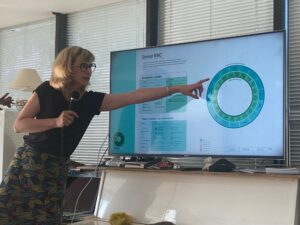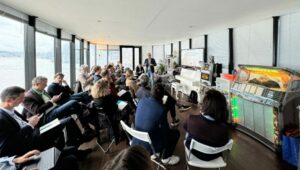💡 Companies & post growth: welcome to terra incognita
💡 Companies & post growth: welcome to terra incognita
Paris, 20 June 2023: during this second session on post growth organised by Futura-Mobility, Vincent Wisner, managing director of Prophil, and Maylis Cartigny, director of its research department, joined forces with the think tank to give participants ideas on the subject of ‘What if my company became post-growth?’
A consultancy and research firm, Prophil is actively involved in exploring a new way forward for businesses and entrepreneurs. Its study, Post-growth for business, available to download, explains and illustrates how to apply the post growth concept at company level.
The session was divided into two parts: an introductory presentation, followed by a workshop with groups of participants focused on applying post growth to three Futura-Mobility member companies: SNCF, Keolis and Valeo.
Post growth applied to companies: governance, economic models, accounting
“We have examples on almost a daily basis that reveal how a certain number of our economic models as we had designed them are now obsolete over the short or medium term,“ introduced Vincent Wisner.
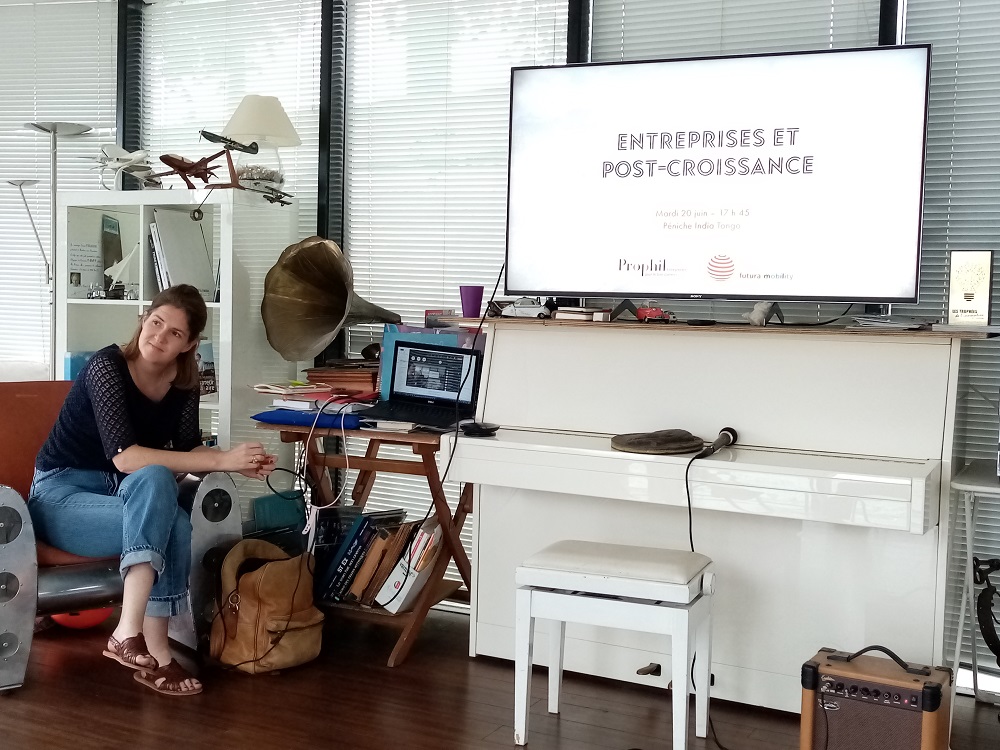
Referring to Géraldine Thiry’s impressive presentation at Futura-Mobility’s first session on 7 June 2023, explaining the macro-economic foundations of post growth, Prophil’s CEO expressed his opinions on green growth. “This techno-solutionist approach is very present in political and entrepreneurial verbatims. It may be a kind of magical thinking, perhaps even a kind of blindness intended or not; a belief that, thanks to certain technical solutions, we will be able to meet the challenges we face. Géraldine Thiry spoke of the impossibility of absolute decoupling of GDP growth from a reduction in exploiting the resources that enable this economic activity to be generated.”
Prophil has adopted the term post growth because it conveys the need to get out of the growth debate and “ultimately be agnostic about it, as advocated by Kate Raworth,” explained Mr Wisner. It’s also a question of moving away from the growth/degrowth debate, “an ideological dead end that doesn’t allow for constructive debate and peaceful discourse.” According to the firm’s director, “indeed we may have to go through a form of degrowth in some of our activities, but we also need to grow another part of our activities that are socially and environmentally useful to society.”
The main idea, applied at corporate level, is instead to “reincorporate economic activities into an ecologically safe and socially just space.” Everything remains to be done in this terra incognita that is post growth applied to businesses, but the stakes are so high, tackling this unknown territory is essential “and exciting.”
After giving a few examples of companies that have made this important shift – Danish energy company Orsted, CAMIF in France – Maylis Cartigny reaffirmed the close link between accounting, governance, and business models for achieving this transition.
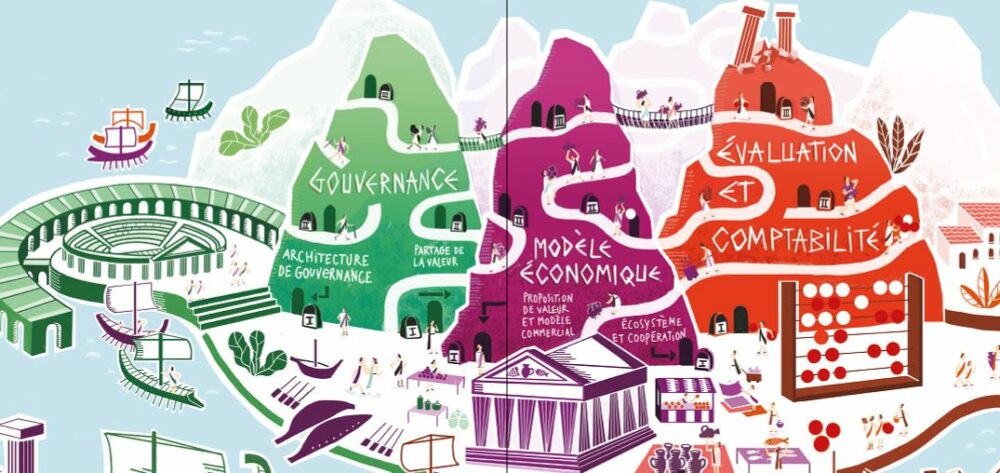
Redirecting the business model encompasses the notion of giving up, and even the usefulness of activities in the light of social and environmental issues. Transforming the business model is a key step towards post growth: redirecting the company’s value proposition, its sales and marketing practices, and transforming the logic of competition into cooperative ecosystems represent challenges as well as key steps in leading the company towards a sustainable model.
Developing governance addresses the question of sharing power and value within the company, which must be able to extend them to multiple stakeholders – not only to ensure value is shared, but also that it serves a real purpose (societal and environmental) for its stakeholders (value chain, employees, territory, etc).
In order to align all the company’s stakeholders and make certain the interests of some do not prevail over others, Riversimple, which has been developing light hydrogen vehicles for over 10 years, has devised an original form of governance: its founder, Hugo Spowers, decided the company’s stakeholders would be represented in the general assembly by six distinct groups: investors, the environment, customers, employees, suppliers, and the community. Each stakeholder group is given voting rights to approve strategy and appoint management. To avoid any conflict of interests, this voting doesn’t give rise to dividends.
Similarly, the shareholder foundation model, which allows to distinguish between political and financial rights, is also inspiring: following the example of Patagonia, which recently caused a buzz by declaring that “its only shareholder is the Earth,” or Bosch (since 1964!).
Finally, the topic of accounting is crucial, since it concerns reporting on activities and ultimately raises the question “how to count what really counts,” like the impact on water consumption or pollution, CO2 emissions, the well being of employees, and so forth. For the director of PROPHIL’s research division, “there are three key areas for accounting: 1. measuring all assets, and here we are beginning to see a European ambition; 2. integrating measurement into the company’s decision-making process; 3. transforming accounting jobs.”
Indeed, reporting on extra-financial data of companies is becoming increasingly widespread thanks to regulations (a new milestone has been reached with the CSRD, now coming into force), enabling large companies to begin extra-financial steering of their activities. This opens up the possibility of structuring extra-financial data into multi-capital accounts, as has been tried out by some businesses over the last few years (Kering’s Environmental Profit & Loss tool, as well as strong sustainability methods like CARE and LIFTS, currently being tested within medium-sized companies).
Post growth applied to companies: case studies!
Following this theoretical introduction, participants were given the opportunity to further explore post growth ‘in action’ by applying it to three Futura-Mobility member companies: SNCF, Valeo and Keolis. The working groups explored the challenges in two steps. Firstly, they diagnosed the company’s activities with regards key mobility challenges (health, carbon footprint, resources, land use, inclusion), and compatibility of its mode of governance with post growth. Next, they proposed a redraft of the company’s mission, worked on the business models, and assessed the degree of change required.
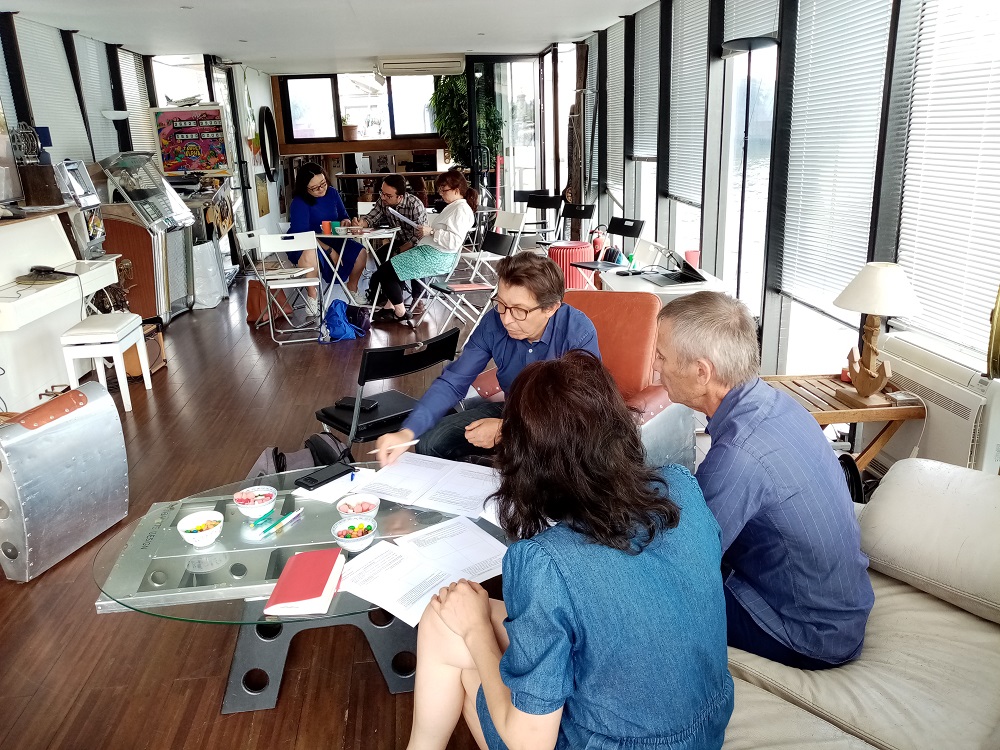
Without revealing the conclusions company by company, through this exercise participants questioned the value companies bring to society. It even provided an opportunity to identify avenues for innovation, like boosting use of public transport networks by transporting goods during off-peak hours; the need to work with the entire industry to ensure the recyclability of materials used to build vehicles; paying more attention to the needs and well-being of transport cleaning staff; developing partnerships to facilitate multimodality and renouncing others that favour individual mobility; and working on desirable visions for shared mobility…
The discussions proved extremely fruitful! All the participants appreciated this practical exercise, which could be done with company executives over a much longer and more transformative period of time, obviously calling for a strong commitment from executives, since the degree of change needed can be quite significant in the transition to post growth.

